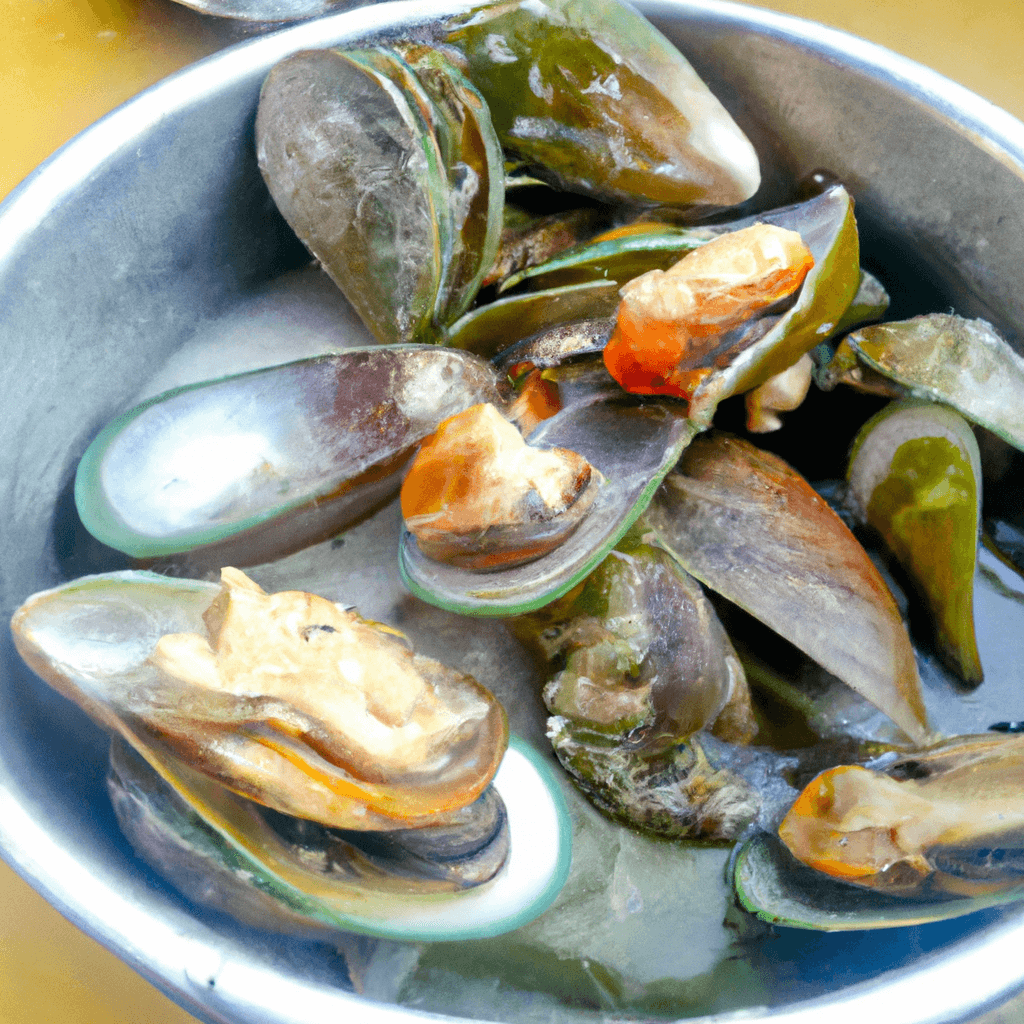Can dogs have mussels? This is a question that many dog owners are asking. Mussels are an excellent source of protein and other nutrients that can provide health benefits for humans, but are they also beneficial for dogs? In this article, we will explore the potential risks and benefits of feeding mussels to your dog.
As well as provide some tips on how to feed mussels safely to your furry friend. We will also discuss the types of mussels that are safe for dogs, and other alternatives that can provide the same health benefits.
What is the Nutritional Value of Mussels for Dogs?
Mussels are a great, nutritious snack for your pup! They’re packed with lots of essential amino acids and fatty acids, making them a great source of protein. Mussels are also rich in copper, zinc, iodine, and selenium, as well as vitamins A, B12, and E.
Plus, they’re low in calories and fat, making them an ideal treat for dogs who need to watch their waistlines. Mussels are also a great source of omega-3 fatty acids, which can help to reduce inflammation and improve skin and coat health.
Plus, they’re a great natural source of glucosamine and chondroitin, which can help to protect and strengthen joints. Overall, mussels are a great, healthy snack for your pup that can provide lots of health benefits. Plus, they’re delicious, so your pup is sure to love them!
The Potential Health Benefits of Feeding Mussels to Dogs
If you’re looking for a healthy treat for your pup, why not try mussels? Not only are mussels an affordable, sustainable protein source, but they also have some amazing health benefits for your pup. Here’s a look at some of the potential health benefits of feeding mussels to your pooch.
First off, mussels are a great source of nutrients. They provide your pup with essential amino acids, fatty acids, vitamins, and minerals, which can help keep their coat and skin healthy and improve their overall health and vitality.
Mussels are also a great source of zinc, a vital mineral that helps support your pup’s immune system, joints, and overall health. Mussels are also a great source of omega-3 fatty acids. These fatty acids are essential for healthy skin and coat, as well as improved joint health, cognitive function, and cardiovascular health.
Mussels are also a great source of glucosamine and chondroitin. These two compounds are vital for joint health and can help reduce joint pain and stiffness. Glucosamine and chondroitin can also help reduce inflammation, which can help your pup stay active and healthy.
Finally, mussels are a great way to add variety to your pup’s diet. Not only are they packed with essential nutrients, but they also have a unique taste that your pup will love.
So, if you’re looking for a healthy treat for your pup, why not consider mussels? Not only are they an affordable and sustainable protein source, but they also have some amazing health benefits for your pup. Give them a try today and see the difference it can make in your pup’s health!
How to Safely Introduce Mussels to Your Dog’s Diet
Introducing mussels to your dog’s diet can be a great way to provide them with a healthy, nutritious snack. However, it is important to follow some safety guidelines when introducing mussels to your pup’s diet. Here are a few tips for safely incorporating mussels into your dog’s diet:
- Make sure to buy fresh mussels: Mussels should be purchased from a reputable source, preferably a local fish market or grocery store. They should smell fresh and not have any discoloration or slimy residue.
- Check for any signs of damage: Before feeding your pup, check the mussels for any signs of damage. Any signs of cracking, holes, or discoloration should be avoided.
- Cook the mussels: Mussels should always be cooked before serving them to your pup. Boil them in a pot of salted water for around 10 minutes until they open. Discard any mussels that don’t open.
- Serve in moderation: Mussels are high in protein and omega-3 fatty acids, but they also contain a high amount of cholesterol.
- Therefore, it is important to feed your pup mussels in moderation. By following these safety guidelines, you can ensure that your pup enjoys a healthy, tasty treat with mussels.
What Kind of Mussels Can Dogs Eat?
Dogs can eat mussels, but it’s important to make sure that you’re giving them the right kind. The best type of mussels for dogs are farm-raised or canned mussels. Wild mussels can contain bacteria and toxins that could make your pup sick, so it’s best to avoid them.
If you’re serving mussels to your pup, make sure they’re cooked thoroughly. Mussels can be served as a snack or added to their regular meals. Dogs love the taste and crunch of mussels, so they make a great treat! Just remember to serve them in moderation, as too many can cause an upset stomach.
Tips for Choosing the Right Mussels for Your Dog
1. Choose mussels that are free from toxins and contaminants: Make sure the mussels you buy for your pup have been harvested from clean waters and are free from toxins and contaminants. Check with your local pet store to ensure they source their mussels from a safe, reliable source.
- Look for smaller mussels: Smaller mussels are easier for your pup to digest and are less likely to cause digestive issues.
- Avoid mussels with a strong odor: If the mussels you purchase have a strong odor, they’re likely, not fresh and may not be safe to feed your pup.
- Opt for fresh mussels: If possible, purchase fresh mussels, as they are more nutritious than frozen or canned mussels.
- Consider your pup’s dietary needs: If your pup has any dietary restrictions or allergies, make sure to select mussels that are free from any ingredients that your pup can’t have.
- Check for any potential allergens: Mussels can contain allergens, so it’s important to check the label to make sure the mussels you purchase don’t contain any potential allergens for your pup.
- Consider the size of your pup: If you have a small pup, you may want to opt for smaller mussels to make them easier to chew and digest.
What Are the Risks Associated with Feeding Mussels to Dogs?
Feeding mussels to your dog may seem like a great idea – they’re packed with omega fatty acids and vitamins, and they’re pretty tasty. However, there are some risks associated with feeding mussels to your pup.
First and foremost, mussels can contain bacteria and parasites that can make your dog sick. This can range from mild gastrointestinal upset to more serious issues such as paralysis, fever, and even death.
If you choose to feed your dog mussels, make sure you buy them from a reputable source, cook them thoroughly, and don’t feed your pup any raw mussels. Mussels also contain a compound called D-aspartic acid, which can be toxic to dogs in large amounts.
This can cause vomiting, diarrhea, and even seizures. If your pup does consume too much D-aspartic acid, it’s important to get them to the vet right away. Finally, mussels can be a choking hazard for dogs, especially those with smaller mouths.
Make sure to watch your pup closely when feeding them mussels, and break them into small pieces to reduce the risk of choking. Overall, feeding mussels to your pup can be a great way to give them some extra nutrients. However, it’s important to be aware of the risks associated with feeding your pup mussels in order to keep them safe.
How to Cook Mussels for Dogs
Cooking mussels for your pup can be a great way to add some extra nutrients and flavor to their meals. Here’s how to do it:
- Start by purchasing fresh mussels. Make sure to look them over and discard any that are cracked, open, or otherwise damaged.
- Rinse the mussels with cold water to remove any sand or dirt.
- Place the mussels in a large pot and cover them with a few inches of water.
- Bring the pot to a boil, then reduce the heat and simmer for about 10-15 minutes.
- Once the mussels have opened, remove them from the pot with a slotted spoon and let them cool.
- Now you’re ready to serve them! Mussels can be served as is, or you can mix them in with your pup’s regular food.
- Enjoy! Remember, it’s important to only feed your pup mussels in moderation, as they are high in fat and calories.
Also, if you have any questions about the safety or nutritional value of mussels for your pup, be sure to check with your vet first.
What Are the Different Types of Mussels and Which Ones Are Best for Dogs?
Mussels are a type of shellfish that can make a great addition to your pup’s diet. But not all mussels are created equal! Here are some of the different types of mussels and which ones are best for your pup. – Blue mussels: These are a type of mussel found in both fresh and saltwater.
They are an excellent source of protein, omega-3 fatty acids, and minerals. They are also low in fat. Blue mussels are a great choice for dogs. – Green-lipped mussels: These mussels are found in New Zealand and are known for their high levels of omega-3 fatty acids.
They are also high in protein and minerals, making them a great choice for dogs. – Atlantic mussels: These mussels are found along the Atlantic Coast of North America and Europe. They are high in protein and minerals, but they are also high in fat, so they may not be the best choice for dogs.
Pacific mussels: These mussels are found in the Pacific Ocean and are another great source of protein, omega-3 fatty acids, and minerals. They are also low in fat, making them a great choice for dogs.
Farm-raised mussels: These are mussels that have been raised in a controlled environment on a farm. They are generally high in protein and minerals, but they may have lower levels of omega-3 fatty acids.
Overall, blue mussels and green-lipped mussels are the best choices for dogs due to their high levels of protein, omega-3 fatty acids, and minerals. Pacific mussels and farm-raised mussels are also good choices, but they may be lower in omega-3 fatty acids. Atlantic mussels should be avoided due to their high-fat content.
How Much Mussels Should You Feed Your Dog and How Often?
When it comes to feeding your pup mussels, the general rule is to feed them in moderation. Start by giving them just a handful of mussels once a week. If they seem to like them and don’t have any negative reactions, you can increase the amount slightly.
As with any new food, it’s important to watch your dog closely for any adverse reactions. If you decide to feed your dog mussels more frequently, you should not exceed 2-3 handfuls per week. Mussels are high in protein and are a great source of omega-3 fatty acids, vitamins, and minerals, so they can be a great supplement to your dog’s.
Regular diet. Just make sure to buy mussels from a reputable source and give them a good rinse before giving them to your pup. It’s also a good idea to cook them first to make sure there are no bacteria or contaminants.
1 Is There a Difference Between Mussels for Human Consumption and Mussels for Dogs?
Yes, there is a difference between mussels for human consumption and mussels for dogs. While mussels can be a great source of protein for both humans and dogs, the preparation and sources of the mussels can vary. For humans, mussels are typically harvested from the ocean and prepared in a variety of ways, from steaming to baking.
These mussels are often eaten raw, so it is important to purchase them from a reputable source that follows food safety guidelines. When it comes to mussels for dogs, it is best to buy them freeze-dried. This ensures that the mussels are free of parasites and bacteria that could be harmful to your pup.
Additionally, freeze-dried mussels are easier to store and last much longer than fresh mussels. In conclusion, there is a difference between mussels for human consumption and mussels for dogs. While both can be healthy protein sources, it is important to prepare them differently and choose a high-quality source.
In conclusion, while it is possible for some domesticated dogs to eat mussels, it is not recommended. Mussels are high in nutrients, but they also contain toxins that could be harmful to canines. If you do decide to offer mussels to your dog, do so in moderation, cook, and always consult your veterinarian first.




